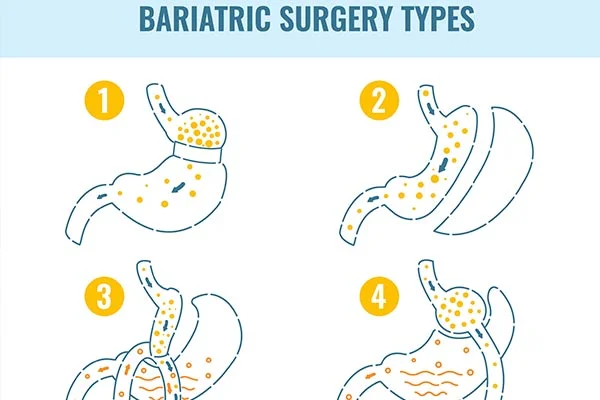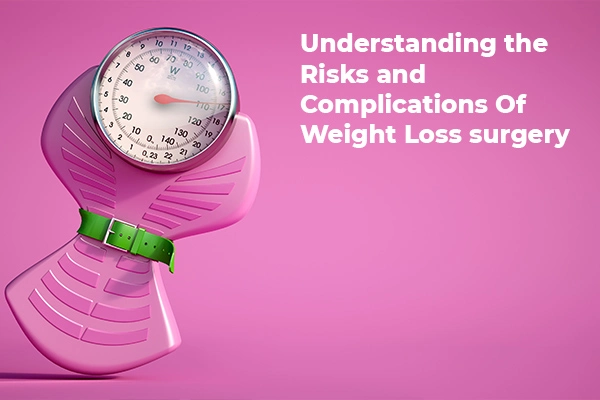Embarking on a weight-loss surgery journey is a significant decision that can transform your life. Whether you’re considering gastric bypass, gastric sleeve, or another form of bariatric surgery, it’s essential to be well-informed before taking the plunge. At Auralia Clinics, we believe that understanding the process, risks, and lifestyle changes involved is key to achieving the best possible outcome.
Here’s what you need to know before undergoing weight-loss surgery.
Understanding Weight-Loss Surgery

Weight-loss surgery, also known as bariatric surgery, encompasses various procedures designed to help individuals with obesity lose weight by altering the digestive system.
These surgeries are not a quick fix, but rather a tool to assist you in achieving significant, long-term weight loss when traditional methods like diet and exercise have not been successful.
Types of Weight-Loss procedures

There are several types of weight-loss surgery, each with its own benefits and risks:
- Gastric Bypass: This procedure involves creating a small pouch from the stomach and connecting it directly to the small intestine. It reduces the amount of food you can eat, and the calories absorbed by your body.
- Gastric Sleeve: In this surgery, a large portion of the stomach is removed, leaving a smaller, tube-shaped stomach. This reduces the amount of food you can eat and decreases hunger hormones.
- Gastric Banding: A band is placed around the upper part of the stomach, creating a small pouch. The band can be adjusted to control the amount of food you can eat.
- Mini Gastric Bypass (MGB): The Mini Gastric Bypass is a weight-loss surgery that reduces the stomach size and bypasses part of the small intestine, limiting food intake and calorie absorption. It’s less invasive than traditional gastric bypass and helps with long-term weight loss and improvement in conditions like diabetes and high blood pressure.
- Endoscopic Sleeve Gastroplasty (ESG): Endoscopic Sleeve Gastroplasty is a non-surgical, minimally invasive procedure that reduces the stomach’s size using an endoscope. This limits food intake, leading to weight loss, and is a good option for patients who aren’t candidates for surgery.
Each procedure has its own set of advantages and potential drawbacks, and the right choice depends on your health, weight loss goals, and lifestyle.
The Importance of a Comprehensive Medical Evaluation: Weight Loss surgery

Before undergoing weight-loss surgery, it’s crucial to have a comprehensive medical evaluation.
This assessment will help determine whether you’re a suitable candidate for the procedure and identify any potential risks.
Physical Health Assessment Before Your Weight Loss surgery
Your surgeon will evaluate your overall health, including any underlying medical conditions such as diabetes, hypertension, or sleep apnoea. These conditions can influence both the choice of surgery and the potential risks involved.
Psychological Evaluation
Weight-loss surgery is not just a physical transformation, it also requires significant mental and emotional adjustments.
A psychological evaluation is often necessary to ensure you’re mentally prepared for the lifestyle changes that come with surgery, such as altering your eating habits and managing the emotional aspects of rapid weight loss.
Understanding the Risks and Complications Of Weight Loss surgery

While weight-loss surgery can offer life-changing benefits, it’s important to be aware of the potential risks and complications. These may include:
Surgical Risks: As with any surgery, weight-loss procedures carry risks such as infection, blood clots, and complications related to anaesthesia. It’s important to discuss these risks with your surgeon at Auralia Clinics and understand how they may affect your decision.
Nutritional Deficiencies: Because weight-loss surgery alters how your body absorbs nutrients, you may be at risk for nutritional deficiencies. You’ll need to take vitamin and mineral supplements to prevent these deficiencies and maintain your overall health.
Lifestyle Adjustments: After surgery, you’ll need to make significant changes to your diet and lifestyle, this includes eating smaller, more frequent meals, avoiding certain foods, and committing to regular physical activity.
Understanding and accepting these changes is crucial to your long-term success.
The Role of Pre-Weight Loss surgery Preparation

Proper preparation is key to a successful weight-loss surgery outcome. At Auralia Clinics, we guide you through every step of the preparation process to ensure you’re fully ready for the journey ahead.
Dietary Changes: Before surgery, you may need to follow a specific diet to make the procedure safer and easier to perform. This diet typically involves reducing calorie intake, limiting carbohydrates, and increasing protein consumption.
Setting Realistic Expectations: It’s important to have realistic expectations about the results of weight-loss surgery. While the surgery can help you lose a significant amount of weight, it’s not a miracle cure. Long-term success depends on your commitment to maintaining a healthy lifestyle, including regular exercise and a balanced diet.
What to Expect During Recovery from Weight Loss Procedure

Recovery from weight-loss surgery is a gradual process that requires patience and dedication. Understanding what to expect can help you prepare both physically and mentally.
The Immediate Post-Surgery Period: In the days following your surgery, you’ll need to rest and allow your body to heal.
You’ll start with a liquid diet and gradually reintroduce solid foods as your body adjusts.
It’s normal to experience some discomfort, but our team at Auralia Clinic will provide you with the necessary pain management and aftercare instructions.
Long-Term Lifestyle Changes: Weight-loss surgery is just the beginning of your journey.
Long-term success requires ongoing lifestyle changes, including a healthy diet, regular physical activity, and routine follow-up visits with your healthcare team.
It’s also important to continue taking any prescribed supplements to avoid nutritional deficiencies.
Conclusion
Weight-loss surgery is a powerful tool that can help you achieve significant, long-term weight loss and improve your overall health. However, it’s not a decision to be taken lightly. By understanding the procedures, risks, and lifestyle changes involved, you can make an informed choice that aligns with your goals and expectations.
Takeaway
At Auralia Clinics, we’re committed to supporting you every step of the way on your weight-loss journey. If you’re considering weight-loss surgery, take the time to educate yourself, undergo a comprehensive evaluation, and prepare both physically and mentally for the changes ahead. With the right knowledge and support, you can achieve the lasting results you’ve been working toward.

